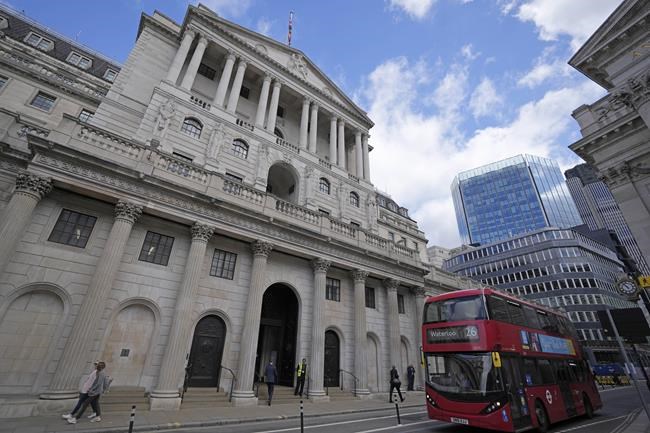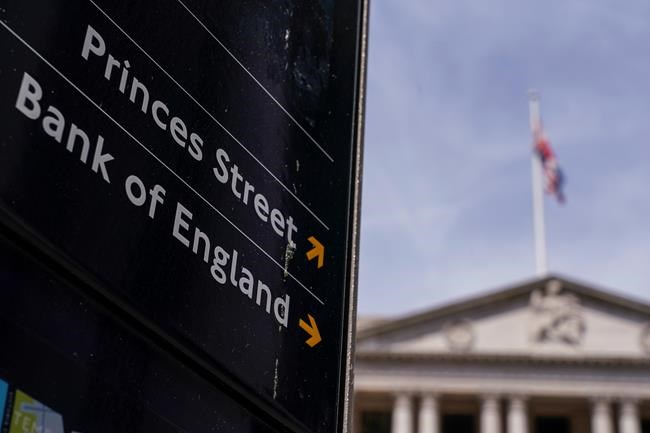Bank of England hikes interest rates but resists bolder move
Advertisement
Read this article for free:
or
Already have an account? Log in here »
To continue reading, please subscribe:
Monthly Digital Subscription
$19 $0 for the first 4 weeks*
- Enjoy unlimited reading on winnipegfreepress.com
- Read the E-Edition, our digital replica newspaper
- Access News Break, our award-winning app
- Play interactive puzzles
*No charge for four weeks then billed as $19 plus GST every four weeks. Offer only available to new and qualified returning subscribers. Cancel any time.
Read unlimited articles for free today:
or
Already have an account? Log in here »
Hey there, time traveller!
This article was published 15/06/2022 (925 days ago), so information in it may no longer be current.
LONDON (AP) — The Bank of England raised interest rates by a quarter-percentage point Thursday, shrugging off pressure for a bolder move to combat price increases that have pushed inflation to a 40-year high.
The bank’s monetary policy committee voted 6-3 to boost its key rate to 1.25%, with the dissenters supporting a larger half-point increase. The U.S. Federal Reserve acted more aggressively on Wednesday, raising its benchmark rate by three-quarters of a percentage point to a range of 1.5% to 1.75%.
The United Kingdom’s central bank said its decision was based on an effort to contain inflation without choking off economic growth, which was just starting to recover from the coronavirus pandemic when food and energy prices began to rise worldwide. But the bank indicated it was ready to act more decisively if inflation becomes more deeply embedded in the economy.

“The scale, pace and timing of any further increases in bank rate will reflect the committee’s assessment of the economic outlook and inflationary pressures,” the bank said. “The committee will be particularly alert to indications of more persistent inflationary pressures, and will if necessary act forcefully in response.”
The decision came as the bank said it expects inflation to peak at more than 11% in October, a full percentage point higher than its previous forecast. The consumer price index rose by 9% in April, the highest since 1982 and more than four times the bank’s 2% target.
While the Bank of England began raising rates before its counterparts, it has now fallen behind the Fed in the worldwide fight against inflation fueled by soaring food and energy prices. None of the bank’s five consecutive increases since December has been more than a quarter-point.
Some analysts criticized the bank for failing to act more decisively in the face of a worsening economic picture.
“With the BoE seeing CPI at 11% — no less — in October, saying it will act forcefully if needed, and that it is particularly alert to more persistent inflation pressure … this begs the question: Why not hike more aggressively now? Why wait?” said Fawad Razaqzada, a market analyst at StoneX.
The war in Ukraine has boosted food and energy prices as the fighting disrupts shipments of oil, natural gas, grain and cooking oil. That is adding to price increases that began last year as the global economy started to recover from the COVID-19 pandemic.
Bank of England policymakers have been cautious about raising interest rates too quickly, arguing that many of the price pressures facing the British economy are external and beyond the bank’s control.
But price increases are now becoming embedded in the economy, fueling demands for higher wages and slowing economic growth as consumers and businesses curtail purchases.

Figures released this week by the Office for National Statistics showed that economic output stagnated in February and shrank by 0.1% in March, raising concerns that Britain may be headed for a recession.
The World Bank last week downgraded its outlook for the global economy and raised concerns about the return of “stagflation” — the combination of high inflation and sluggish growth last seen in the 1980s.
Nevertheless, a majority of the Bank of England’s monetary policy committee indicated that there had been “fairly limited” economic developments since the bank’s last report in May, according to the minutes of their meeting.
The three members who voted for a bigger increase were more pessimistic about the strength of the causes of inflation.
“These members also judged that monetary policy should lean strongly against risks that recent trends in pay growth, firms’ pricing decisions, and inflation expectations in the economy more widely would become more firmly embedded,’’ the minutes said. “Faster policy tightening now would help to bring inflation back to the target sustainably in the medium term, and reduce the risks of a more extended and costly tightening cycle later.’’


